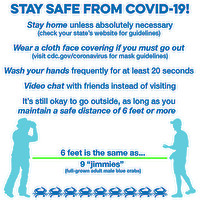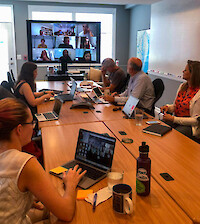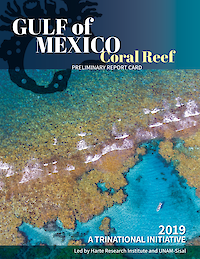IAN is working remotely during the COVID-19 crisis

Consistent with UMCES guidelines, IAN staff are doing their part to reduce the spread of COVID-19 by working remotely. IAN will conduct workshops and meetings virtually where possible for the duration of the crisis. IAN staff are equipped to work from their homes, and will continue to make progress on ongoing projects through the use of teleconference and video conference tools. We sincerely wish everyone safety and health as we all work to contain the spread of this disease.
Moving to the "new normal"

Meetings and workshops are essential for scientists and resource managers to share information and knowledge, achieve consensus, and co-create material. We at IAN have been facilitating in-person workshops around the world to engage with diverse stakeholders and co-create science communication products. The current pandemic has made in-person meetings impossible, and such meetings are likely to become less frequent well into the future. The IAN team is pushing forward by holding virtual workshops, employing our videoconferencing and facilitation experience and skills. This strategy has the additional benefits of a) reducing the IAN carbon footprint, b) reducing time lost in long and difficult travel, and c) being able to increase the global dissemination and impact of IAN efforts. We plan to use our experience in video conferencing and facilitation to facilitate virtual workshops. Read Bill Dennison's blog about IAN's facilitation experience here.
Preliminary Gulf of Mexico Coral Reef Report Card released!

The Harte Institute for Gulf of Mexico Studies and the Autonomous University of Mexico at Sisal released the first-ever report card on the condition of coral reef ecosystems in the Gulf of Mexico. Heath Kelsey facilitated the two-day workshop to create the report card, which involved representatives from the US, Mexico, and Cuba. The report card results indicate that coral reef ecosystems are threatened everywhere, but some areas seem to be doing better than others. The main threats to ecosystem health include increasing ocean temperature, coastal development, and overfishing. In addition to the report card, a video was produced that documents the report card workshop and perspectives on coral reefs throughout the region.
Due to the global coronavirus pandemic, ISBW14 and WSC2020 are postponed until summer 2022

We will update everyone as we have more information. Please discontinue abstract submission at this time, and stay safe and healthy. Visit the ISBW14 website for more details.
Developing new international report cards
Bill Dennison and Vanessa Vargas-Nguyen will be leading an international collaboration to develop innovative report cards for iconic embayments around the world. The four-year project, called "COAST Card," will develop report cards in Chesapeake, Manila, and Tokyo Bays as well as the Goa coast of India. This project is funded through the Belmont Forum, an international partnership that mobilizes funding of environmental change research from over two dozen counties in an effort to remove critical barriers to sustainability.